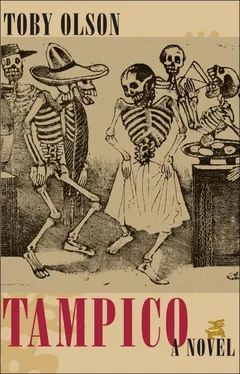“Depends upon geology,” Frank said. “Sand’s good, but they say there’s shifting they hadn’t counted on. And who knows what else they’ll find down under there.”
“The beams looked okay,” Gino said. “The jacks.”
“How do you think they get a level?” Larry said. “As simple as I imagine?”
“You got it,” Gino said. “A plumb line. Nothing more than that.”
“Well a few instruments, I’d think,” said Frank.
“Of course, of course, but it comes down to that. A plumb line.”
“I’ve been thinking about a job when I was just a kid,” Larry said. “It was on a farm one summer, when I was toughening up. To become a man I guess.”
“When was that?” said John.
“Nineteen twenty-one. I was just fifteen.”
“I was down in Kentucky then,” said Frank. “Not long before I left.”
“What ever happened to that kid?” Gino said. “The one in the chicken house?”
“Adam? I told you that. He left. He wasn’t part of the story at all, not my part.”
“Well, I would have thought, your mother and all.”
“Look,” Frank said. “The guy left. That’s it!”
“There’s a guy in my story too,” Larry said.
“Let’s consider the erosion, then,” John said. “There’s been a good many storms in the last month.”
“There’s erosion in my story,” said Larry.
“Well, the local rag says it’s still safe. To have the equipment behind the thing I mean. But it looked pretty fucking close to me,” Frank said. “Didn’t you think?”
“About fifty yards or so,” said Gino. “But what’s the soil quality under the cliff face? That’s the question.”
“I’m sure they’ve looked into that,” John said.
“They drilled test holes as well,” said Frank. “But they didn’t find that river. Not until now.”
“I’ll give you that.”
“What about this guy got whacked in the head down there?” Gino said, glancing to where the screen had been.
“What about him?” said Frank.
“Do you think it had something to do with the site, some earth shift? It could have.”
“Christ knows.”
“I doubt we ever will,” said John.
“Somebody passed out in my story,” Larry said, and they all turned to him. Then Gino turned to John and spoke again.
“Did you hear about the Ivory soap? I heard it from Carolyn. They grease the rails with it.”
“Not too surprising,” John said. “You should have seen what they used on oil rigs, when they ran out of grease? Chicken fat once, and even rancid tarpon. Smelled to high heaven.”
“I thought I was there once, in Tampico,” Gino said, lighting his pipe again.
They heard the squeak of tennis shoes in the hallway, a click of metal. Then Carolyn stepped in through the solarium doors, a vision of loveliness, early to work this evening, in her starched A-line, white cotton stockings, and cute little hat. Her hair touched her ears in blond ringlets, and she was carrying a tray, a plate piled high with sugar cookies, and her keys jingled against each other at her hip.
“Hi there!” Gino said, his pipe in his hand now and his shoulders squaring up.
She moved to Larry’s small table, bent over and set the tray down, then rose and turned to each of them, smiling in anticipation and concern.
“Everything’s just fine,” John said.
“The cookies. That’s good!” said Gino.
“It’s all in order,” said Frank, and Carolyn nodded, then turned and headed for the doorway, her steps light and the A-line twitching from side to side, and they listened for the hushed whisper of her stockings as she headed down the ward.
“That little hat,” Gino said. “I like that!”
“In your dreams,” Frank said.
“Like a nun’s hat,” said Larry.
“Oh, my!” said Gino.
“Let’s not get blasphemous, now.” It was John, and he was laughing lightly, tapping another cigarette on the can.
“There’s one in my story,” Larry said, and they all turned to him, then Frank spoke.
“She’s two hours early. At least that.”
“Do you think it’s Kelly?”
“Kelly was upset about something.”
“Maybe it’s the dead guy,” Gino said. “Something about that. I mean, to get things in order you know?”
“What’s to order?” Frank said.
“One less to be sucking,” said John, “to be cleaning. Just the one guy out there now.”
“For the time being,” said Gino, then Larry began.
It was Salt Lake City and the Mormons still dressed in the last century. But it was the start of the Roaring Twenties, and there were those coming out from the East in fine clothing and roadsters, stylish, and the women revealing themselves and the Mormon men with their heads down under their hats. And to be a Catholic child then in that oppressive city, but in view of the actuality of alternatives, was the burden that got him away from home and into the country, one summer, to a Catholic farm near Oakley.
There was another boy his age on the farm, from another school, and there was a nun on the farm, daughter of the owner, who had arranged for the boys to be there, to learn the ways of hard work and to toughen into Catholic men who could stand up in the face of the Latter-day Saints for the true religion of Jesus. She was young and beautiful and passionate, and though she had no idea of boys or even of the finer tenets of her religion and was a fool for Christ, she was an immaculate vision in black and white on the farmhouse porch. She’d look out over the dusty yard, hands on her hips, to where the boys worked at the greasy undercarriage of a tractor, rancid in the ooze of their adolescence.
She came, and then she went back to the city, then she came out on the porch again, and the boys abused themselves in the night thinking of her, unsuccessfully, then turned to a search for other visions. And when she came back for a whole week of summer vacation and followed out behind them, lifting her black skirts, the beads of her long rosary clacking, to watch them at work, they stiffened up as if they were men and focused to handle their tools with complete ease and sophistication.
“His name was Matthew, a beautiful boy as I remember, lean and articulate in his bony structure, smooth-chested, a mop of blond curls like a city flapper. He had a delicate nose, a sweet disposition, and the voice of an angel in the singing of comic nursery rhymes in our nights.”
The work was to dig up stumps in a meadow where trees had been cut, and the farmer had brought out the tractor and chain the night before and had left them there. The boys carried the axe and the shovels, and Theresa the nun followed them with the wicker basket, water and sandwiches, oranges and a few bananas.
They had to climb a rocky rise in the dawn light, and when they looked back to the nun struggling up behind them in her habit they imagined they were enacting the passion, she Mary Magdalene following the soldiers carrying the tools of crucifixion. She wore a half moon of immaculate white over her breast, sweat fell from her brow to stain it, and her hat was an archway over her beautiful girl’s face, her veil a silken banner on the breeze.
The meadow opened into a broad field of wildflowers under the hill, its horizon defined by a low cliff at the edge of a river that in flood rose up to the meadow’s edge. But the river was in recession now, though swollen and carrying pieces of quick-moving flotsam in morning mist and licking at the clay bank.
The tractor was there and the chain, and the stump was a massive old oak, a tree fed by the coursing river through more than a century, the flat surface left by the cutting the size of a dining room table, or a circle drawn in the dust for mibs. The stump rose up to the boys’ shoulders, and they could imagine Theresa kneeling upon it, hands clasped over her full breast, Our Lady of the River. She sat down on the tractor’s step, her hem dragged up to her black ankles, and watched them work.
Читать дальше












